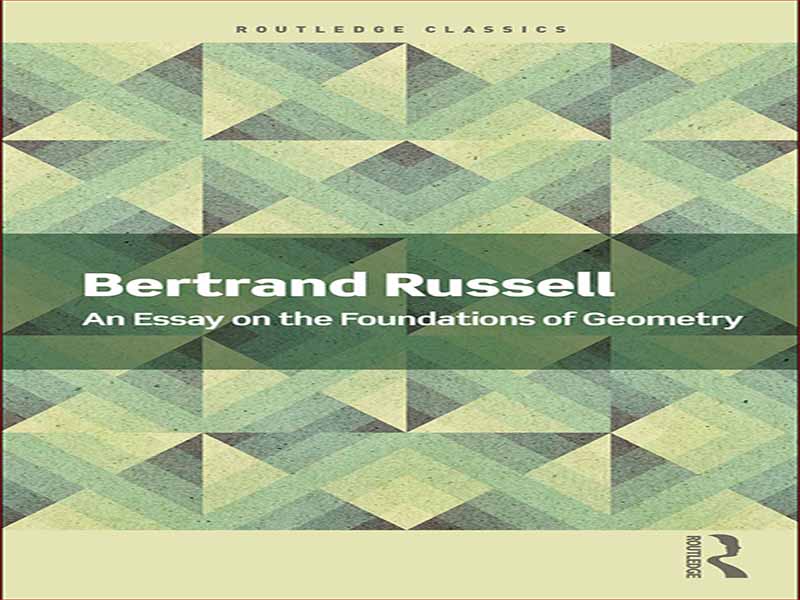- عنوان کتاب: An Essay on the Foundations of Geometry
- نویسنده: RBertrand ussell
- سال انتشار: 2023
- حوزه: ژئومتری
- تعداد صفحه: 223
- زبان اصلی: انگلیسی
- نوع فایل: pdf
- حجم فایل: 4.81 مگابایت
هندسه، در طول قرن هفدهم و هجدهم، در جنگ با تجربه گرایی، قلعه تسخیرناپذیر ایده آلیست ها باقی ماند. کسانی که به طور کلی در قاره معتقد بودند – که دانش معین، مستقل از تجربه، در مورد جهان واقعی امکان پذیر است، فقط باید به هندسه اشاره می کردند: آنها می گفتند که هیچ کس جز یک دیوانه، در اعتبار آن شک نمی کند. و هیچ کس جز یک احمق مرجع عینی آن را انکار نمی کند. بنابراین، تجربهگرایان انگلیسی در این مورد، کار تا حدودی دشواری داشتند. یا باید مشکل را نادیده می گرفتند، یا اگر، مانند هیوم و میل، جرأت حمله کردند، به این ادعای به ظاهر متناقض سوق داده می شدند که هندسه، در انتها، هیچ قطعیتی متفاوت از مکانیک ندارد. آنها گفتند که فقط حضور همیشگی تأثیرات فضایی، تجربه ما از صدق بدیهیات را چنان گسترده کرده است که به نظر قطعیت مطلق می رسد.
با این حال، در اینجا، مانند بسیاری از موارد دیگر، منطق بی رحمانه این فیلسوفان را، خواه ناخواه، به مخالفت آشکار با عقل سلیم روزگارشان سوق داد. تنها از طریق کانت، خالق معرفت شناسی مدرن، بود که مسئله هندسی شکل مدرنی به خود گرفت. او این سؤال را به فرضیات زیر تقلیل داد: اگر هندسه دارای یقین آخرالزمان باشد، ماده آن، i.e. فضا، باید پیشینی باشد، و به این ترتیب باید کاملاً ذهنی باشد. و بالعکس، اگر فضا صرفاً ذهنی باشد، هندسه باید قطعیت آخرالزمانی داشته باشد. فرضیۀ اخیر در نزد کانت وزن بیشتری دارد، در واقع با کل معرفت شناسی او پیوند ناپذیری دارد. با این حال، به نظر من، قدرت بسیار کمتری نسبت به اولی دارد. با این حال، فعلاً فرمول کانتی را بپذیریم و تلاش کنیم تا به اصطلاحات پیشینی و ذهنی دقت کنیم.
یکی از مشکلات بزرگ، در طول این مناقشه، استفاده بسیار متغیری است که نویسندگان مختلف از این کلمات و همچنین واژه تجربی استفاده می کنند. از نظر کانت که روانشناس نبود، پیشینی و ذهنی تقریباً قابل تعویض بودند؛ در کاربرد مدرن، به طور کلی، تمایلی به محدود کردن کلمه ذهنی به روانشناسی وجود دارد، و به طور پیشینی انجام وظیفه برای معرفتشناسی باقی میماند. . اگر این تمایز را بپذیریم، میتوانیم متناسب با مسائل این دو علم، تعاریف موقت زیر را تنظیم کنیم: پیشینی بر هر دانشی اعمال میشود که اگر چه ممکن است توسط تجربه استخراج شده باشد، اما منطقاً در تجربه پیشفرض میشود: ذهنی در مورد آن صدق میکند. هر حالت روانی که علت فوری آن نه در دنیای بیرونی، بلکه در محدوده موضوع نهفته است. تعریف اخیر، البته، منحصراً برای روانشناسی تعریف شده است: از دیدگاه علم فیزیکی، همه حالات ذهنی ذهنی هستند. اما برای علمی که ماده آن، به بیان دقیق، فقط حالات ذهنی است، اگر بخواهیم از این کلمه برای هر هدفی استفاده کنیم، به نوعی تمایز میان حالات ذهنی، به عنوان نشانه ای از ذهنیت ویژه تر از سوی آن ها، نیاز داریم. که این اصطلاح به آن اطلاق می شود.
Geometry, throughout the seventeenth and eighteenth centuries, re-mained, in the war against empiricism, an impregnable fortress of the idealists. Those who held as was generally held on the Continent – that certain knowledge, independent of experience, was possible about the real world, had only to point to Geometry: none but a madman, they said, would throw doubt on its validity, and none but a fool would deny its objective reference. The English Empiricists, in this matter, had, therefore, a somewhat difficult task; either they had to ignore the problem, or if, like Hume and Mill, they ventured on the assault, they were driven into the apparently paradoxical assertion, that Geometry, at bottom, had no certainty of a different kind from, that of Mechanics – only the perpetual presence of spatial impressions, they said, made our experience of the truth of the axioms so wide as to seem absolute certainty.
Here, however, as in many other instances, merciless logic drove these philosophers, whether they would or no, into glaring oppo-sition to the common sense of their day. It was only through Kant, the creator of modern Epistemology, that the geometrical problem re-ceived a modern form. He reduced the question to the following hy-potheticals: If Geometry has apodeictic certainty, its matter, i.e. space, must be à priori, and as such must be purely subjective; and conversely, if space is purely subjective, Geometry must have apodeictic certainty. The latter hypothetical has more weight with Kant, indeed it is inerad-icably bound up with his whole Epistemology; nevertheless it has, I think, much less force than the former. Let us accept, however, for the moment, the Kantian formulation, and endeavour to give precision to the terms à priori and subjective.
One of the great difficulties, throughout this controversy, is the extremely variable use to which these words, as well as the word em-pirical, are put by different authors. To Kant, who was nothing of a psychologist, à priori and subjective were almost interchangeable terms;1 in modern usage there is, on the whole, a tendency to confine the word subjective to Psychology, leaving à priori to do duty for Epistemol-ogy. If we accept this differentiation, we may set up, corresponding to the problems of these two sciences, the following provisional defini-tions: à priori applies to any piece of knowledge which, though perhaps elicited by experience, is logically presupposed in experience: subjective applies to any mental state whose immediate cause lies, not in the ex-ternal world, but within the limits of the subject. The latter definition, of course, is framed exclusively for Psychology: from the point of view of physical Science all mental states are subjective. But for a Sci-ence whose matter, strictly speaking, is only mental states, we require, if we are to use the word to any purpose, some differentia among mental states, as a mark of a more special subjectivity on the part of those to which this term is applied.
این کتاب را میتوانید از لینک زیر بصورت رایگان دانلود کنید:
Download: An Essay on the Foundations of Geometry





































نظرات کاربران